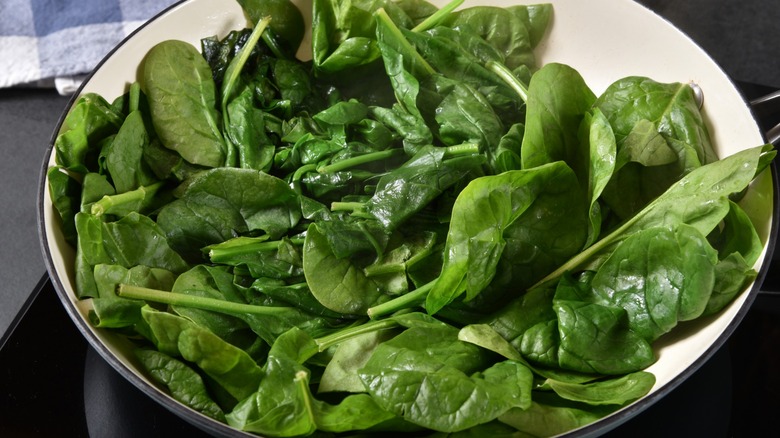The Strainer Hack That Wilts Spinach In A Flash
Spinach has always been a popular green, long before Popeye made it cool. Its mild taste and smooth texture go well with lots of dishes, from pasta to soup. But if you want to use spinach in hot dishes like casseroles as an ingredient and not just as a garnishing, you need to wilt it first.
Now, don't let the word "wilting" throw you off. Wilting and shriveling spinach is a good thing. When spinach wilts, its leaves shrink down, making it easier to mix in with other ingredients, and the leaves get softer and tastier, too. Usually, people wilt spinach by steaming or sauteing it separately. Sure, that works, but it takes time and adds another pot to wash.
If you've got some hot water handy, like leftover pasta water after cooking a tasty dish, grab a strainer or colander and fill it with fresh spinach. Then, when the pasta is ready, just drain it right over the spinach. The hot water from the pasta quickly wilts the spinach, giving you perfectly cooked greens in seconds!
A quick blanch can preserve spinach's texture
Spinach is delicate — it only takes a bit of heat for the leaves to curl up and wilt. But there's a fine line, because spinach can also get mushy if it's cooked for too long. While this is great if you're making soups where the spinach melts into the liquid, like in an eponymous bowl of spinach soup, for dishes like pasta where you want a bit of texture from the spinach, mushiness isn't ideal. That's why, instead of boiling or sauteing the spinach over sustained heat, you'd want to blanch it by giving it a quick bath in hot water. This trick does just that — the hot water quickly passes through the fresh spinach, giving it a quick wilt and leaving you with softened spinach that you can add to your spinach and balsamic cream pasta without a problem.
A parting tip: When you're pouring out the pasta water, don't pour it all out. Leave a little in the pot. Leftover pasta water is a versatile ingredient in the kitchen — it's known as "liquid gold" for a reason. You can use it to thicken sauces and help them stick to the pasta better, or even use it as a base for soups or stocks. This way, you're making the most of everything in your kitchen, and saving time too.

